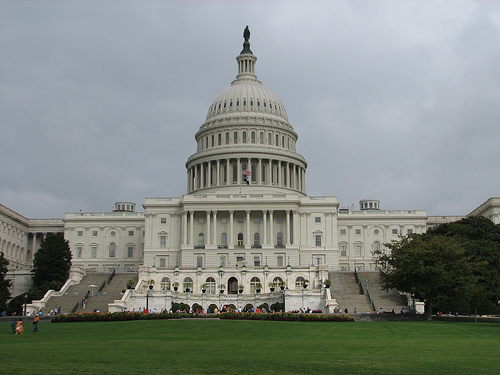This is one for the annals of blog history. Publius at Legal Fiction informs us about a recent decision handed down from the Supeme Court, which clarifies the scope of the Commerce Clause:
SUPREME COURT OF THE UNITED STATES
No. 06-03
United States (Respondent) v. Smith (Petitioner)
Justice SCALIA delivered the opinion of the Court:
This case presents a question of the scope of Congress’s power under the commerce clause. To simplify and clarify our commerce clause analysis, we have consolidated two cases in which petitioners challenge the constitutionality of two federal laws that allegedly exceed Congress’s power to regulate commerce – (1) a law banning local possession of marijuana; and (2) a law criminalizing violence against women. Applying our new standard, we find the marijuana law constitutional and the other one, well, not so much.
I
[unnecessarily long and tortuous narrative of facts]
II
Article I, Section 8 grants Congress the power to regulate interstate commerce. In recent years, the Court’s commerce clause analysis has been accused of being “unclear” and “results-driven.” See Bork, R., What the Fuck Is Up With Scalia in Raich?, 118 Harv. L. Rev 211, 213-14 (2005). Specifically, critics have pointed to the seeming inconsistency between the Court’s decision in Morrison and its decision in Raich (cases coincidentally involving similar facts at the case at issue here). Id. at 215. See also Aging Hippy Liberal Douche, A Post-Modernist Perspective on the Habermasian Dialectic Inherent in Scalia’s Commerce Clause Analysis, 98 Yale L.J. 1201, 1210-11 (2004).
The lower courts have also failed to find a meaningful distinction between the laws struck down by the Court and those upheld. See, e.g., Vedder v. Cobain, 321 F.3d 12, 15 (2004) (Posner, J., dissenting) (“What the fuck is up with Scalia in Raich?”).
In light of this criticism, the Court today announces a new clear standard to guide lower courts in their application of the commerce clause. This new standard will govern when a law exceeds Congress’s power under the commerce clause and when it does not. The new standard is this – a law passed pursuant to the commerce clause is constitutional if Justice Scalia likes the law and unconstitutional if he does not. Similarly, if the law is regulating things that Justice Scalia wants regulated, it is constitutional. If it does not, it is not.
A
In justifying any new constitutional doctrine, we must first of course look to the original understanding of the Holy Framers who ascended Mount Sinai and brought back down the Constitution on stone tablets in 1787. A close look at the ratification debates reveals that the scope of the commerce clause was intended to be equal to, and co-extensive with, Justice Scalia’s political preferences. Here is James Madison in Federalist No. 10:
AMONG the numerous advantages promised by a well constructed Union, none deserves to be more accurately developed than its tendency to break and control the violence of faction. The friend of popular governments never finds himself so much alarmed for their character and fate, as when he contemplates their propensity to this dangerous vice. He will not fail, therefore, to set a due value on any plan which, without violating the principles to which he is attached, provides a proper cure for it.
While at first glance this appears to have nothing to do with the commerce clause, if you switch around some of the letters, it spells: Do What Scalia Wants. See, e.g., Hamburgler v. Burger King, 521 U.S. 321, 341-42 (2003) (Thomas, J., concurring) (“As Harry Potter has taught us, mixing around letters can reveal important insights into the Framers’ original understanding and Lord Voldemort’s evil plans.”).
B
While this new standard is a marked improvement over our prior doctrine, we recognize that lower courts will need additional guidance in determining just what Justice Scalia likes and dislikes. Although multi-factored balancing tests are generally for commie pinkos and Justice Kennedy, there is not always a clear answer to these questions. Instead, lower courts must look at the many things Justice Scalia likes and dislikes and then determine how the law relates to them.
For instance, Justice Scalia dislikes many things – hippies, long-haired hippies, hippies with beards, long-haired hippies wearing sandals, the homosexual agenda, assisted-physician suicide, Will & Grace, long-haired bearded hippies wearing sandals, long-haired hippies wearing sandals and burning flags, the Florida Supreme Court, Justice Kennedy, Satan, the New Deal, and the equal protection clause.
On the other hand, Justice Scalia likes many things – police, police arresting hippies, laws criminalizing drug possession, laws criminalizing drug possession by hippies, duck hunting, barbeque, John Ashcroft, Jesus, and the equal protection clause in the context of presidential elections.



 In my right-hand column, I have a little thingee reporting the current number of U.S. soldiers killed and injured in Iraq to date. Don’t be fooled by the numbers, people. The casualty toll is actually higher. The numbers, for example, don’t take into account people like Specialist Douglas Barber, an Iraqi War veteran who suffered from PTSD.
In my right-hand column, I have a little thingee reporting the current number of U.S. soldiers killed and injured in Iraq to date. Don’t be fooled by the numbers, people. The casualty toll is actually higher. The numbers, for example, don’t take into account people like Specialist Douglas Barber, an Iraqi War veteran who suffered from PTSD. 
 Daniel Rubin
Daniel Rubin


